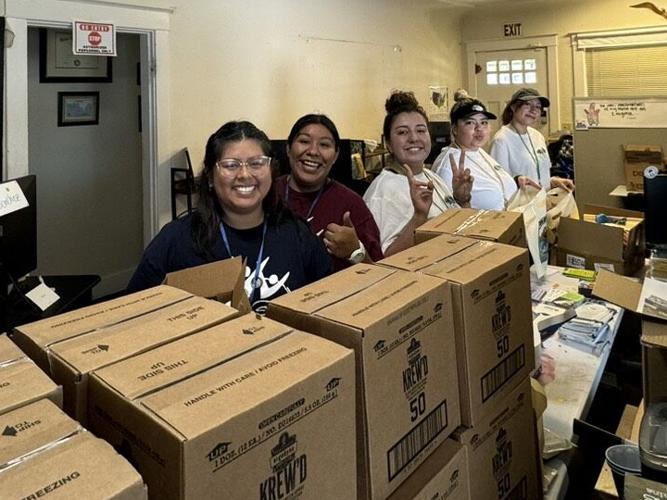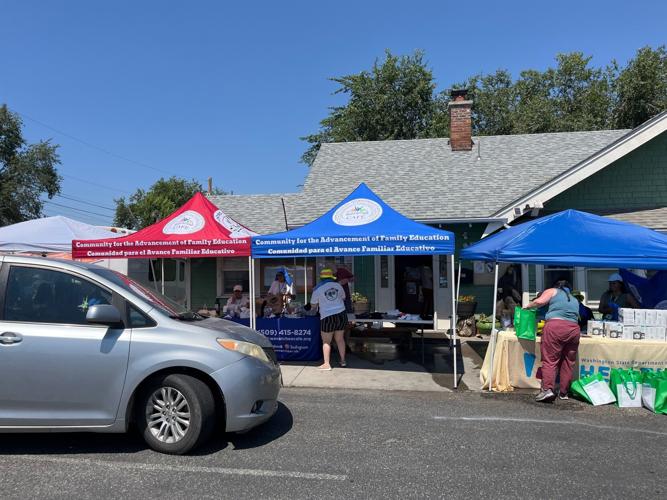
Protecting farmworkers: Wenatchee nonprofit provides resources amid heat waves, wildfire season
watch
Listen
(Runtime 1:09)
Read
As heat waves and wildfire season continue, the Community for the Advancement of Family Education or CAFÉ, a local nonprofit, organized a drive-through event for agricultural workers to collect face masks and informational flyers.
“Farmworkers are in these terrible conditions and a lot of them are leaving because they don’t have the resources and are just seeing these extreme health defects,” said Yesenia Perez, the environmental justice coordinator for CAFÉ.
Originally planned as an outdoor event, extreme heat prompted the nonprofit to convert the resource fair into a drive-through. More than 60 vehicles lined up, filled with people receiving face masks, cooling rags, hats, hydration packs and educational pamphlets. Volunteers provided materials in both English and Spanish, including guides on heat illness prevention and sexual harassment.
Agricultural workers, who often work outdoors, are exposed to harmful air pollution, including wildfire smoke. According to the American Lung Association approximately 78% of these workers identify as Hispanic or Latino.
CAFÉ primarily serves the growing Latino population in Wenatchee and the surrounding North Central Washington area. The organization collaborates with the Washington State Department of Natural Resources to prepare the community with a “Wildfire Ready Plan.” Residents can schedule free consultations with local wildfire experts to better protect their homes.
Perez is part of the consultation team visiting homes in Wenatchee. She distributes air filters to help families maintain clean air inside their homes.
“We refer folks to different resources that might help with the cost. Sometimes, replacing things might not be feasible immediately. We advise people to keep their homes clean and identify key risks both inside and outside their homes for wildfire prevention,” Perez explained.
Cherry harvest season, which runs from June through early August, coincides with wildfire season. The American Lung Association reports agricultural workers are 35 times more likely to die from heat-related stress than workers in other industries.
“With very short harvest windows, once the cherries are ripe, they need to be picked. Many workers and employers are in the position of needing to work and earn that income. Many farmworkers make their best income on cherries and would not be happy if they couldn’t get those hours,” said Jon DeVaney, President of the Washington State Tree Fruit Association.

DeVaney noted that Washington state has been at the forefront of protecting outdoor workers. Employers in many industries are required to comply with smoke rules set by the Washington State Department of Labor & Industries.
Despite regulations in place to protect outdoor workers, there is reportedly a significant lack of educational resources. A 2023 study by the UC Davis Western Center for Agricultural Health and Safety focused on how wildfire smoke impacts farmworker parents in Washington state. Surveying families in Chelan and Okanogan counties, the study found a critical need for more resources to prepare farmworkers for unpredictable smoke events and to better equip worksites.
Perez from CAFÉ is passionate about farmworker-fire education, driven by her firsthand experiences of seeing her family work in harsh outdoor conditions. She witnessed the lack of resources and education available to her family and aims to change that by organizing events like CAFÉ’s recent drive-through.
“One of the biggest issues is knowing that it is hot but not knowing how and when it can affect you. The most important thing in mitigating risk is education. Once people get that seed of information, it can spread far within the Latino community, as most people are very connected with their families,” said Perez.
For more information on state requirements of the wildfire smoke rule for employers visit:
Online tools to check air quality include:
Reneé Diaz may be contacted at diaz@wenatcheeworld.com. Collaborative reporting by The Wenatchee World, NWPB and Murrow College of Communication Newsroom Fellowship.















